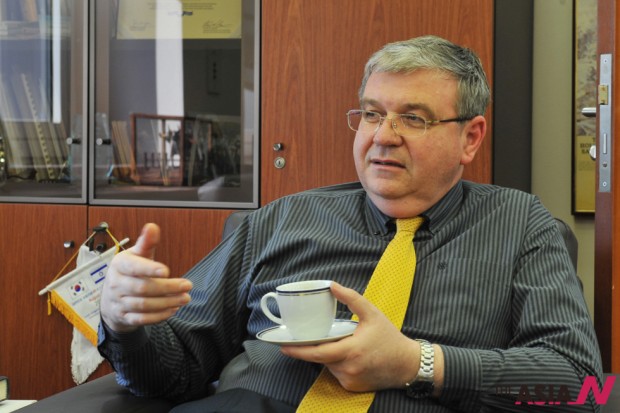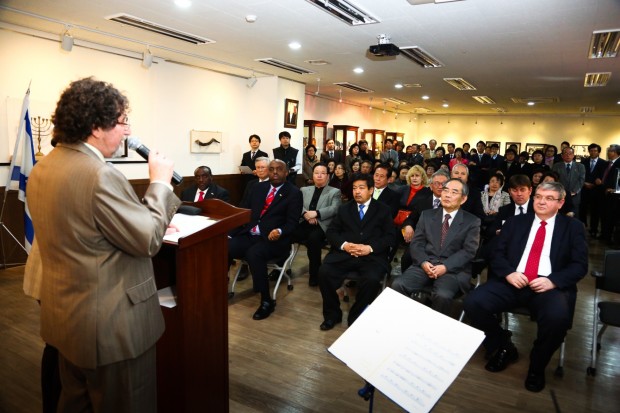Asia’s first Holocaust Museum opens in Busan
Interview with Israeli Ambassador Tuvia Israeli
“We would like to share the story and lessons of the Holocaust. There are many similarities, but yet so much unknown.” Israeli Ambassador to Korea Tuvia Israeli told The AsiaN about the opening of the Busan Israel House in late February at the Israeli Embassy in Seoul.
One of Amb. Israeli’s passions is to promote teaching and education on the Holocaust. To further such education about the Holocaust in Korea, the Busan Israel House, Israeli-Jewish Culture Center and Holocaust Memorial Museum and Education Center opened on March 4. About 150 guests participated in the opening ceremony including foreign ambassadors, professors, and high-ranking government officials from Busan.
The Israeli Embassy supported Jay and Keum Kronish’s initiative to establish this center to bring Busan the history and culture of Israel and the Jewish people with special emphasis on the Holocaust. The Israel House will also showcase Israeli artifacts and display the contributions of Israelis in various fields. Many special events are being planned such as photo exhibitions, presentations and seminars on the Holocaust and Israel.
Amb. Israeli himself had a tragic personal history. His family members were victims of the Holocaust. Fortunately, his parents survived, but both of his grandparents died in the concentration camps. Israeli was born in Romania, but his family moved to Israel when he was young and they changed their last name to “Israeli” to signify a new beginning.
What are some similarities between Korea and Israel?
Telling you about the similarities between Korea and Israel is easy. Some other countries might have to put some effort to do so, but not Israel.
First of all, Koreans sometimes call themselves the “Jews of Asia.” The people of the two nations are ancient people and are not large in both population and territory. They both have rough histories: Korea was colonized and went through the Korean War whereas the Jewish people did not have a nation for thousands of years and millions of lives were lost through the Holocaust.
Both countries fought for their independence and Israel became an independent state in 1948, the same year that South Korea established its government after being liberated from Japanese colonial rule in 1945. Both nations have security challenges due to hostile neighbors, few natural resources and have been recognized for their rapid economic successes.
Tell us about the exchange between the two nations.
There have been several high-level visits between the two countries in the past few years. In June 2010, President Shimon Peres visited Seoul and shortly after in 2011, an 11-member parliamentary delegation visited Israel and met with Israeli President Shimon Peres. Numerous cultural exchanges are also taking place. Start-up Nation, a book about the story of Israel’s economic miracle that was published in 2009, has attracted many Korean delegations to Israel.
In Korea, the Israeli Embassy has been in organizing and supporting many cultural and educational programs about Israel in Korea. This past January, the Israeli embassy organized the “Israel in Photography” exhibition with the Korea Foundation along with a two lectures on the Israel’s history, culture and society along the theme of the exhibition. Nami Island is one of our good partners. Last year, we held an Israel Cultural Weekend at Nami Island including the Israeli photographer Duby Tal’s photo exhibition ‘Sea of Inspiration.’ In 2011, the Nalaga’at Theater Company, in which all the actors are deaf, blind or deaf-blind, were invited to perform in Korea. There is a large participation of Koreans in Israeli events.
Starting from March 7, the Israeli embassy began online chatting sessions with the ambassador through Facebook where anybody could ask any question to the ambassador about Korea-Israeli relations, exchange between the two countries, Israeli culture and education. About 30 people participated in the first chat session, which was conducted in Korea through translation.
How many Israelis are living in Korea and what are their occupations?
The Israeli community is very small in Korea. There are perhaps a total of 12 students. The rest of the 100 or so Israelis living in Korea are mainly working at large corporations. Israeli tourists are less than 10,000 a year. Korea is still “undiscovered” by the Israeli people.
Please tell us about the Israeli education system.
The education system in Israel and Korea are completely the opposite. The only similarity might be the drive of the mothers to push their children. In Korea, the education system is overly competitive where you may say the education system is too relaxed in Israel.
Koreans are quite curious about the Israeli education system. The Jewish people have a long tradition of reading and studying the Bible. One of the Jews first obligations has been to study and teach the bible. Therefore, fathers taught their child to read and write and understand the Bible. It was first done orally and then Rabbis accumulated the wisdom of these lessons as well as discussions and debates about the Bible, wrote them down and the final accumulation became the Talmud.
One attribute of Jewish students are that they are not satisfied with anything. The constant arguments and discussions continued to contribute to development and arguments are now second nature. The modern classroom is full of questioning the teacher and this habit of questioning goes beyond the classroom and to the workplace where questioning of bosses, direct communication, and asking questions are legitimate, accepted and believed to increase productivity.
Please tell us about Israel’s mandatory military service.
In Israel, there is three-year mandatory military service. In order to make the best use of this time, Israel screens for talented youth as early as high school to put them in the right military service programs so that they can develop and eventually contribute to society. In some programs, the young person would have university studies or special technology training during his military service. That would enable him to become an engineer or a scientist while being a soldier. If the military has invested in an individual during his three mandatory years of service, he or she would need to serve more time from 5 to 10 years. But, after the third mandatory year, he would receive a monthly salary. And, once this young man or woman finishes their military service, they can enter the market ready with their diploma and a lot of experience, which makes them very demanded by the market.
What can Korea learn from agriculture in Israel?
Fruits and vegetables in Korea are too expensive. The orange was the first export from Israel, but since water is very expensive and limited, it wasn’t very profitable. Israel abolished exporting the orange and went on to growing and exporting luxurious, exotic agricultural products that are difficult to grow such as avocados, flowers, peppers, tomatoes, dates, etc. Israel is a leader in agricultural technologies even though its geography is not conducive to agriculture. Korea should also focus on more profitable and effective agriculture. The use of modern technology is very important and agriculture must be attractive to the youth.
What are some areas where Israel and Korea can strengthen ties and partnerships in?
Both countries are very concerned with renewable energy, especially as they are heavy importers of energy. Israel and Korea also have experience with developing countries and good security. Since Israel and Korea have so much in common, there is much room for strong partnerships.
Israel and Korea have a nice volume of trade even though the potential is much higher. Our economies are different and do not compete. Korea is a production economy producing cars, ships and machinery. Israel is a powerhouse of innovation and ideas. If we combine Korea’s good infrastructure of production and Israel’s powerhouse of innovation and production, we can achieve much more.
Another area where we can collaborate is overseas aid and development. Israel has much experience with water conservation due to the country’s chronic water problem. Israel and Korea both have much experience in international development aid and have potential to be excellent partners as Israel could bring its experience and training expertise and Korea, its large pool of volunteers.
Could you share some solutions to the North Korean nuclear crisis?
The North Korean issue is not an issue that can be easily solved. It needs the help of the international community. The international community can help the situation by making some decisions. But, at the same time, Korea must be strong and not show signs of weakness.
North Korea and Iran have a similar agenda. I read an article about a North Korean official commenting how the North was going to get rid of South Korea and it reminded me how of Iran is often threatening to get rid of our state. The international community should do its best to prevent the possibilities of nuclear proliferation by following safeguards like banning the exports of certain materials to the two countries. Iran should never get a hold of the nuclear weapons, as it will lead to many other countries obtaining this technology, which will make this world a very dangerous place.
What is Israel’s position in the democratization movement in the Middle East?
Israel is pro-democracy, but is fearful of the democratization process happening too fast and destabilizing the region, as it is having negative effects on Israel. Israel was on very good terms with Egypt before the Egyptian revolution, but afterwards border clashes started to arise between our two countries. The uprising and civil war in Syria is also endangering the security of Israel.
This is Ambassador Tuvia Israeli’s first post in East Asia. He has entered the foreign ministry in 1978 and has held posts in Jordan, Geneva, Sweden, Paraguay, and Egypt. He is enjoying his stay in Korea very much except for the fact that it is his first post overseas without his family.




























































